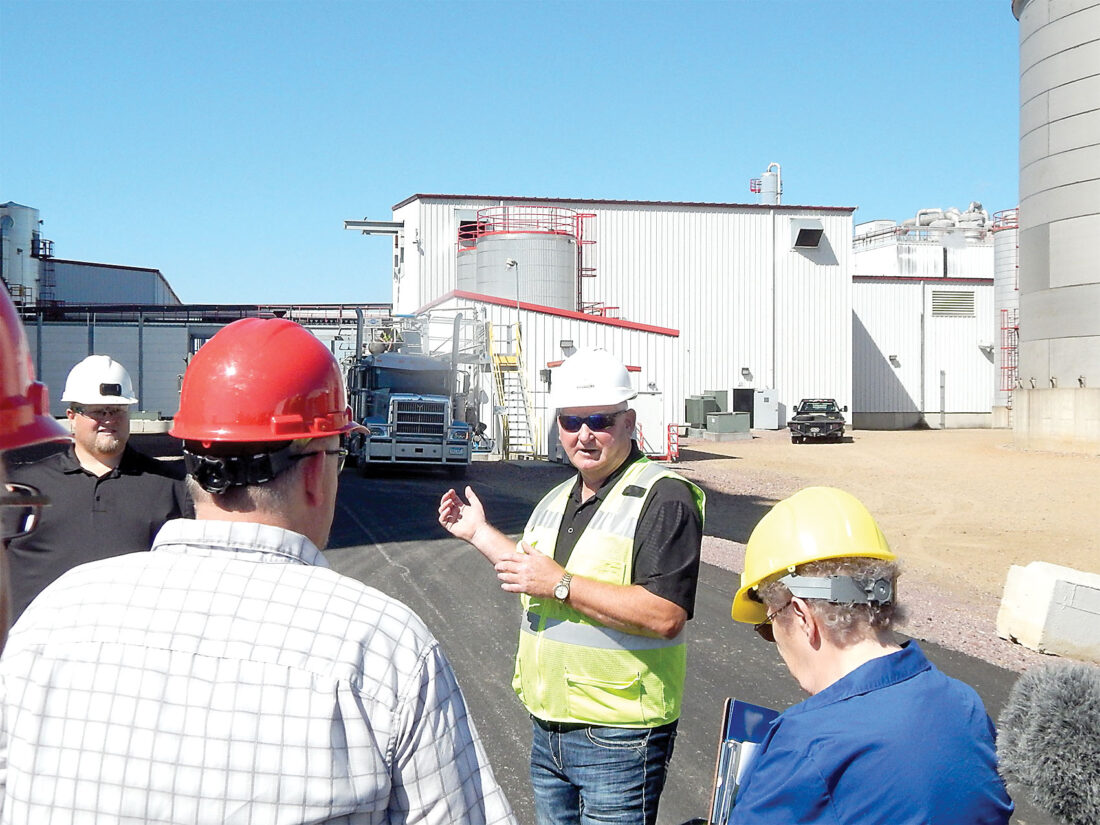CO2 disposal
$3.7B proposed project would store greenhouse gas underground

Photo by Fritz Busch Highwater Ethanol CEO Brian Kletscher leads a tour of the ethanol plant west of Lamberton Tuesday. Highwater is one of 32 facilities partnering with Summit Carbon Solutions in proposing a $3.7 billion carbon dioxide capture and storage project involving five upper Midwest states.
LAMBERTON — Media and government officials toured the Highwater Ethanol plant Tuesday for the unveiling of a proposed $3.7 billion carbon dioxide capture and storage project.
Highwater Ethanol is one of 32 ethanol plants in Minnesota, Iowa, Nebraska, North and South Dakota partnering with Summit Carbon Solutions (SCS). The $3.7 billion project planned to begin in August 2023 would capture carbon dioxide emissions from ethanol plants, compress it, and transport it by underground pipeline to North Dakota for permanent storage more than a mile underground, according to SCS.
SCS CEO Lee Blank said the project would be part of the 45Q Carbon Capture Tax Credit program in which qualifying facilities can “generate” a tax liability offset per capture ton of carbon dioxide.
The project, estimated to take a year to complete, would have to be approved by the Minnesota Pollution Control Agency (MPCA) and Minnesota Public Utilities Commission (PUC).
SCS is working with landowners, community leaders, stakeholders, and other people with transparency to obtain rights for any proposed temporary and permanent easements.
Minnesota ethanol plants in the project besides Highwater west of Lamberton are Granite Falls Energy, Bushmills Ethanol Inc. Atwater, Heron Lake BioEnergy, and Green Plains Inc., Fairmont.
SCS investors are John Deere, Continental Resources, Tiger Infrastructure, TPG Rise Climate and Summit Agricultural Group.
Partners include Minnkota Power Cooperative, which gave SCS access to the largest of only three permitted carbon dioxide storage sites in the U.S.
While some media reports from South Dakota include landowner opposition to the use of eminent domain for pipeline development, Highwater CEO Brian Kletscher said “from my understanding, eminent domain is not available in Minnesota.”
Eminent domain is defined as the power of a city, state or federal government to take ownership of private property for public use.
“(SCS) wants to talk to and work with farmers on the project first,” said Kletscher.
“I think this is a very safe project,” Kletscher said. “I look forward to working with Summit Solutions and the great opportunity for the ethanol industry as a whole to sequester our CO2 in the ground. I think that’s very important.”
In media information, Summit Carbon Solutions describes carbon dioxide as a gas in atmospheric conditions and as a dense phase deep underground or in a pipeline. A dense phase has the viscosity of a gas but a density closer to that of a liquid.
In addition, SCS defined carbon dioxide as non-explosive, non-combustible and dispersed as a gas when introduced to conditions outside a pipeline.
CO2 pipelines have an excellent safety record exceeding pipelines that carry other materials and would not affect surrounding soil when transported at ambient temperature, (air temperature of the surrounding environment).
For more information, visit summitcarbonsolutions.com.



